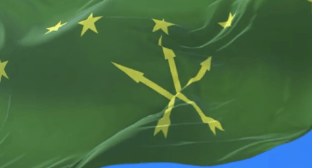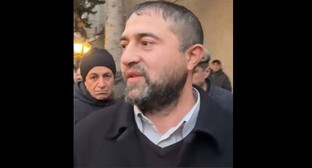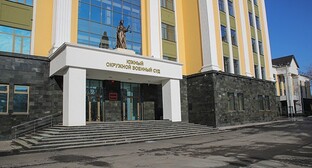30 March 2006, 17:14
Head of PEN-Centre sees political or commercial motivation behind claims by tax inspectorate
The next sitting of the Moscow's 9th appellate court of arbitrage which considers the complaint by the Russian office of PEN-club international organization of writers and poets (Russian PEN-Centre) against the ruling of the Moscow court of arbitrage on payment by the centre of 1 million and 18 roubles as a fine for evading the land tax, will take place on Monday, March 3. This has been reported to the "Caucasian Knot" correspondent by Alexander Tkachenko, general director of the Russian PEN-Centre.
A. Tkachenko explains the "Caucasian Knot" correspondent that the above sum has been imposed on his organization by the Moscow court of arbitrage upon a law suit of the Russian Federal Tax Service (FTS) Inspectorate No. 2 in Moscow which claims that the writers failed to pay the land tax for the period from 2002 to 2004 for the land occupied by the PEN-Centre building, in the amount of 496,000 roubles. The Inspectorate has also imposed a fine in the amount of 800,000 roubles for the long period of failure to pay. All in all, the public organization is required to pay about 2,300,000 roubles. While the Tax Inspectorate had to apply to court for imposing a fine, it issued collection orders for the amount of the tax itself and the penalty fee which had accrued (about 1,300,000 roubles in total) to the bank where the PEN-Centre has a settlement account, and the bank is obliged to automatically withdraw the money from the account.
In this way, the amount of 72,000 roubles has been withdrawn from the PEN-Centre, annually transferred to it by the Russian Ministry of Culture for paying grants to poor literati.
According to Tkachenko, on March 27, during the first session of the Moscow's 9th appellate court of arbitrage which considers the complaint of the Russian PEN-Centre against the fine, the judge tried to sort out the calculations on which the amount of the fine imposed by the Tax Inspectorate was based. "They were examining the rates at which the tax and the fine were calculated, why the amount is so high, why did not the Inspectorate impose the fines earlier, why did they wait for several years until a huge amount accrued which we can not afford to pay. The judge requested that the Tax Inspectorate provide exact calculations and the grounds for imposing the fines by the next session on March 3," relates the head of the writers' organization.
"Our main problem is the law suit against the Moscow Tax Inspectorate No. 2 in which we are going to appeal against the amounts imposed on us as the land tax and the penalty fees. We plan to file this suit at the Moscow court of arbitrage in about a week's time," continues Tkachenko. According to him, the lawyers' association "Omega" has agreed to render the PEN-Centre free legal assistance.
The PEN-Centre chair considers the Tax Inspectorate claim as ungrounded because, according to him, his organization is neither the land owner nor its lease-holder: "The building has been given us for a fixed term. Under the Moscow legislation, we do not rent the land occupied by the building, it belongs to Moscow. The Tax Inspectorate claims that we must pay for the land. The Moscow Land Committee insists that this is our land and we are free do anything with it. It is a complex legal case and they have caught us unawares."
"Since I believe in the presumption of innocence, I can not firmly assert that the Tax Inspectorate's request is politically motivated. Still, I assume that this is either an instruction of the authorities who are discontented with our independent viewpoint or someone intends to take away the land from us, together with the building. It's location is advantageous for commercial activity, it is in Neglinnaya Street, in the centre of Moscow, near the "Uzbekistan" restaurant. If we divide the tax of 496,000 roubles, imposed on us, into three years for which it was calculated it means that the tax was 6,000 dollars per year. For a non-profit organization it is an unbelievable sum," states Alexander Tkachenko, a writer and human rights activist.
The Russian PEN-Centre often criticizes Russian authorities for violations of human rights in Chechnya and political persecution of dissidents. Last November, the Russian PEN-Centre published a statement containing sharp critics of amendments to the law on non-government and public organizations. "The law, if it is passed, will lead Russia to isolationism and incapability to work in the international legal space which we already share with democratic countries. . In our view, it may be detrimental for the maturing of the civil society," the statement runs.
The Russian PEN-Centre executive committee includes Liudmila Ulitskaya, Alexander Gorodnitskiy, Evgeniy Bunimovich, Igor Irteniev and other well-known Russian literary people. Writer Andrei Bitov is the organization's President.
For reference, President Putin signed the notorious law on non-profit public organizations (NPОs) on January 10.
The law strengthens state control over the activity of public organizations in Russia. It also prohibits opening offices and branches of foreign non-government organizations on the territory of closed administrative territorial units. The authorities may refuse registration to any public committee or organization if they do not like it or if its targets, tasks and forms of activity, in the opinion of functionaries, may run counter to the Constitution and the federal legislation. The financial supervision over the activity of non-profit organizations, including foreign ones, will be exercised by the Rosregistratsiya (registering) agency. However, this supervision is going to be indirect, via the tax service and the financial monitoring agencies. Audits should be conducted maximum once a year.
Despite the fact that the law caused sharp criticism both in Russia and in the West, the State Duma passed it in its third reading on December 23, and the Council of the Federation followed suit.
Active protests against the draft law have been undertaken by civil society activists in Voronezh, Samara, Archangelsk, Rostov, Ryazan, Kirov, Vladimir, Moscow, St-Petersburg, Ekaterinburg, towns of Saratov, Pskov, Chelyabinsk and Kemerovo Regions, in Chuvashia, Karelia and other Russian regions.
On November 10, the "Human Rights in Russia" internet portal (hro.org) started an action to collect signatures under the statement of non-government organization "No to strengthening control over civil society!" More than five thousand civil society activists have signed the statement against the law which deteriorates the situation of the NGOs. The statement was initiated by the Democracy and Human Rights Development Centre, the "Memorial" centre, the "Demos" centre, the Russian Union of Committees of Soldiers' Mothers, the Moscow Helsinki Group, the Socio-Environmental Union, the Institute of the "Public Agreement" national project, and a number of other leading Russian NGOs.
Author: Vyacheslav Feraposhkin Source: CK correspondent




